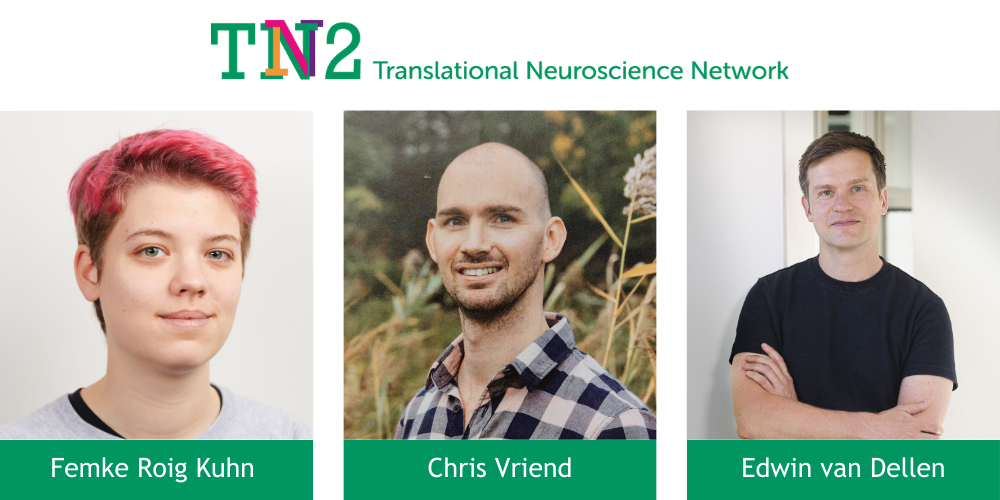General
TN2 is back! Join the all-new Translational Neuroscience Network of Amsterdam Neuroscience for our first event this academic year. The topic of the symposium is 'Heterogeneity in Psychiatry: Finding unity in uniqueness.'
The afternoon will be filled with three inspiring talks by experts in the field of Psychiatry: Femke Roig-Kuhn (VU Amsterdam), Chris Vriend (Amsterdam UMC) and Edwin van Dellen (UMC Utrecht).
We will explore heterogeneity in psychiatry from the cellular to the symptom level. Can we harbor heterogeneity in proteomics to better understand symptom trajectories in psychiatric disorders (Femke Roig-Kuhn, VU Amsterdam)? Do subtle variations in brain networks matter for medication effectiveness (Chris Vriend, Amsterdam UMC)? And what challenges does heterogeneity pose to the field of precision medicine (Edwin van Dellen, UMC Utrecht)?
After the presentations, there will be a panel discussion where links between the different fields are explored, and where we will have the opportunity to discuss how we could address challenges that arise from heterogeneity in psychiatry in the future.
We will end the afternoon with a networking borrel where you can meet your colleagues and exchange ideas about your own work!

Program:
15:30 - 17:00 Presentations and panel discussion
17:00 - 19:00 Networking drinks
More information:
Femke Roig Kuhn - PhD Candidate at Molecular and Cellular Neurobiology (MCN), at the Center for Neurogenomics and Cognitive Research (CNCR)
The neuropsychiatric disorders major depressive disorder (MDD), bipolar disorder (BD) and schizophrenia (SZ) are leading causes of disability globally. These disorders have partially overlapping symptoms, complicating diagnosis, and often lead to inaccurate treatment. Identifying what sets them apart at the molecular level can improve diagnosis and therapies to manage their impact on quality of life. Here, we performed a quantitative proteomics analysis on the Netherlands Brain Bank Psy-cohort (n=170 patients with MDD, BD, SZ (n=13-30 per disease), and controls), comprising grey matter of the superior temporal (GTS) and frontal gyrus (GFS), from donors with extensive clinical data compiled in the Netherlands Neurogenetics Database. The brain areas chosen were previously implicated in these disorders. Our aims were to 1) establish a molecular profile of disease status to find global disease-specific markers, and 2) use these profiles to examine how much these disease types overlap based on their molecular signature. Patient-clustering based on >6000 high confidence identified and quantified proteins (peptide detection rate 75%; ≥2 peptides per protein) from these two brain areas showed a clear separation based on tissue type, and age. Analysis per tissue type with age as co-factor showed the most differentially regulated proteins between patients and controls for GFS tissue (2% of proteome; FDR q-value 0.05). GOAT analysis revealed overrepresentation of upregulated proteins involved in synaptic transmission and downregulated metabolic processes. Surprisingly, MDD showed clear post-synaptic protein dysregulation compared to BD (SYNGO analysis). Synaptic fraction isolation of selection samples showed similar results. Multiple sex-specific DEP were identified, pointing to sex as an important factor to consider. These high-content proteomics techniques can offer new insights into dysregulated proteins and pathways in the brain and potentially lead to discovering new targets for more effective treatment.
Chris Vriend - Clinical Neuroscientist at the departments of Psychiatry and Anatomy & Neurosciences of Amsterdam UMC
Predicting treatment efficacy in psychiatric disorders remains challenging, but pre-treatment characteristics of brain networks may provide valuable insights. In a study of 177 individuals with OCD or PTSD that participated in one of 4 different clinical trials and underwent one of 9 different non-pharmacological treatments I used pre-treatment MRI data of the structural and functional brain network to predict treatment outcome. These analyses showed that pre-treatment network characteristics are related to treatment response, regardless of treatment and psychiatric disorder, and suggest that individual differences in intrinsic features of the human brain network underlie amenability to treatment.
Edwin van Dellen - Clinical Psychiatrist and Associate Professor at the UMC Utrecht Department of Psychiatry, Affective and Psychotic Disorders Unit.
Precision psychiatry is an emerging field that aims to provide individualized approaches to mental health care. An important strategy to achieve this precision is to reduce uncertainty about prognosis and treatment response. While much emphasis has been placed on technical innovation, the complex and varied nature of mental health presents significant challenges to the successful implementation of these models. From this perspective, I review challenges in the field of precision psychiatry, and propose a shift towards prospective research that considers the importance of contextual factors and the dynamic and complex nature of mental health.
Date and Location
Costs and registration
Participation is free of charge.
Registration has closed for live attendence. You can only join via Zoom: Register here

